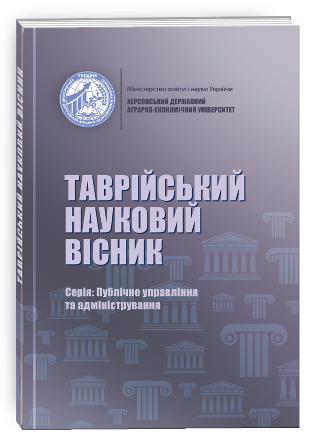THE ROLE OF ANTI-CORRUPTION POLICY IN HEALTHCARE REFORM
DOI:
https://doi.org/10.32782/tnv-pub.2025.2.13Keywords:
anti-corruption policy, health care, reform, transparency, accountability, public administration, corruption risks, accessibility of medical services, electronic system, professional ethicsAbstract
The article is devoted to revealing the role of anti-corruption policy in the process of reforming the healthcare sector and highlights a set of factors that influence the effectiveness of the implementation of relevant measures. The author emphasizes that corruption in the medical sector is one of the main obstacles to improving the quality and accessibility of services, as it leads to inefficient use of budget funds, undermines public trust and complicates the implementation of systemic transformations. An important component of combating abuse in the medical sector is clear legislative regulation, the introduction of transparent procurement mechanisms, the implementation of electronic systems for monitoring and auditing financial flows, as well as the organization of open access to public data on the activities of medical institutions. The study provides examples of international standards that prove the urgent need for coordinated interaction between government structures, professional associations and patient associations in order to timely identify and eliminate corruption risks. Particular attention is paid to the role of state anti-corruption bodies and independent public organizations in ensuring effective control over the implementation of reforms, and the impact of medical education and the formation of ethical standards of behavior on the prevention of offenses among personnel is also revealed in detail. Thus, the article substantiates the strategic importance of anti-corruption measures for increasing the effectiveness of reforms in the medical sector, increasing the level of patient trust and improving the overall quality of life of the population. The argument is presented that the optimal vector for the development of the health care system is a combination of comprehensive organizational changes, active public involvement and the use of innovative technologies to enhance accountability and professionalism. This approach provides a sustainable effect and creates conditions for the emergence of new management and financial models that meet modern global challenges and meet the needs of patients.
References
Про запобігання корупції : Закон України від 14.10.2014 № 1700-VII // Відомості Верховної Ради України. 2014. № 49. Ст. 2056.
Про затвердження Стратегії державної антикорупційної політики на 2021–2025 роки : Закон України від 20.06.2022 № 2322-IX // Відомості Верховної Ради України. 2022. № 44. Ст. 607.
Про публічні закупівлі : Закон України від 25.12.2015 № 922-VIII // Відомості Верховної Ради України. 2016. № 9. Ст. 89.
Про затвердження Стандартів медичної етики та деонтології : Наказ Міністерства охорони здоров’я України від 21.08.2021 № 592 // Офіційний вісник України. 2021. № 79. Ст. 572.
Про схвалення Концепції розвитку електронної охорони здоров’я : Розпорядження Кабінету Міністрів України від 20.12.2017 № 1013-р // Урядовий кур’єр. 2018. № 7.
Про доступ до публічної інформації : Закон України від 13.01.2011 № 2939-VI // Відомості Верховної Ради України. 2011. № 32. Ст. 314.
World Health Organization. Strategies to Combat Corruption in the Health Sector. Geneva : WHO, 2018. 56 p.
Про державні фінансові гарантії медичного обслуговування населення : Закон України від 19.10.2017 № 2168-VIII // Відомості Верховної Ради України. 2018. № 5. Ст. 31.
Проєкт Закону України «Про Державний бюджет України на 2023 рік» : Пояснювальна записка від 15.09.2022 № 8000 // Офіційний портал Верховної Ради України.
Методичні рекомендації щодо здійснення аудиту ефективності у сфері охорони здоров’я : Рахункова палата України, 2021. 48 с.







